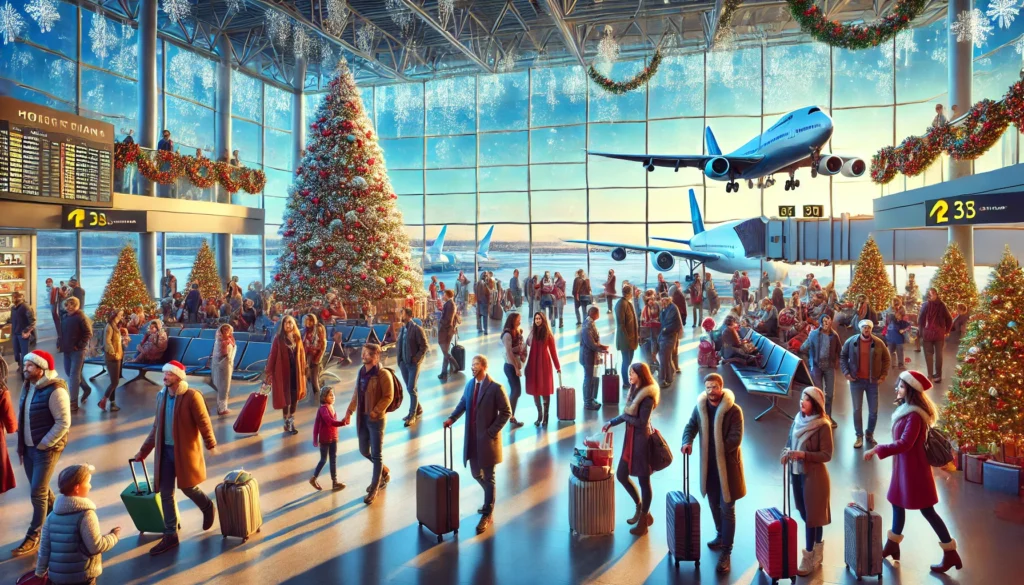Holiday Travel on the Rise: Majority of Americans Set to Travel for Leisure Despite Inflation Challenges
WASHINGTON (Nov. 15, 2024) – The holiday season is here, and Americans are ready to hit the road again! According to a new survey from the Hoteliers Community, 52% of Americans plan to travel for leisure over the next four months, with hotels as the top lodging choice for both leisure (45%) and business (59%) travelers. While inflation remains a barrier, enthusiasm for travel persists, with hotels maintaining their popularity and sustainability growing as a key factor in lodging decisions.
The data reveals that leisure travel is bouncing back, but inflation’s impact continues to affect decisions on lodging, flights, and car rentals. Here, we’ll dive into the survey’s findings, explore how Americans are spending their vacation time, and look at strategies hotels are implementing to capture the holiday market.
Americans’ Holiday Travel Plans
The holiday travel season offers a variety of ways to celebrate. Here’s what the survey found regarding Thanksgiving and Christmas plans:
- Thanksgiving Travel: Approximately 32% of Americans plan to travel overnight for Thanksgiving. Families typically gather for large meals, and many use Thanksgiving weekend to reunite with family members, resulting in a peak travel period.
- Christmas Travel: A similar trend emerges for Christmas, with 34% of Americans likely to travel overnight. This time of year sees many seeking out holiday-themed experiences, whether at home or at popular travel destinations that offer winter events and festivities.
In addition to these seasonal getaways, the study highlights travel preferences:
- Family Trips: A significant 47% of respondents plan family trips, of which 36% intend to stay in hotels. Many are looking for family-friendly amenities such as connecting rooms, pools, and proximity to kid-friendly attractions.
- Romantic Getaways: Around 37% of survey participants are planning romantic getaways, with 52% planning to stay at hotels, often choosing destinations that offer scenic or cozy accommodations for couples.
- Solo Adventures: Finally, solo travel is on the rise, with 32% likely to travel alone over the holidays, and 44% of them opting for hotels. These travelers often seek immersive experiences, such as local tours or wellness retreats, that hotels are increasingly offering.
Inflation’s Ongoing Influence on Travel Decisions
Inflation continues to affect the way Americans approach travel. The survey shows that cost-conscious travelers are adapting their plans and reconsidering certain expenses:
- Impact on Hotel Stays: Fifty-six percent of respondents report that inflation could reduce their likelihood of staying in a hotel over the next four months, an increase from 55% in the spring. To respond, some hotels are adjusting by offering deals, flexible booking policies, and loyalty perks to keep costs down for their guests.
- Reduced Travel Plans: Half of those surveyed said inflation might limit their chance of traveling overnight, and 44% noted it could prevent them from flying. Road trips are a popular alternative, and some travelers are opting for stays closer to home.
- Renting Cars: About 42% mentioned that car rental expenses could hinder their plans, spurring many to look for lodging options close to local attractions or those offering shuttle services to reduce the need for a rental car.
How Americans are Spending Their Vacation Time
The survey also gives insight into the preferences of travelers based on the type of vacation they’re seeking:
- Adventure Seekers: With solo travel on the rise, adventure destinations such as national parks and popular hiking spots are becoming top choices for holiday trips. Solo travelers often value experiences over material goods, making them an ideal audience for hotels offering activities such as guided hikes, local tours, and wellness packages.
- Families: Family travel tends to focus on destinations with activities suitable for all ages, such as theme parks, national landmarks, and holiday festivals. Hotels with amenities like kids’ clubs, adjoining rooms, and family meal options are especially appealing.
- Romantic Getaways: Couples, especially those celebrating anniversaries or milestones, are seeking cozy, private locations with access to dining, spas, and scenic views. Hotels that offer exclusive dining experiences, spa services, or even wine-tasting packages appeal greatly to couples.
- Business Travelers: Interestingly, 23% of working adults plan to take a business trip within the next four months, often extending work trips for leisure. These “bleisure” travelers are a growing market for hotels, as they seek accommodations that balance work and relaxation.
Key Factors in Hotel Selection: Sustainability and Technology
As Americans hit the road, their choices are increasingly influenced by sustainability and technology.
- Sustainability Matters: Sixty-six percent of Americans consider sustainability important in their travel choices, with 57% saying they’re more likely to stay in hotels with sustainable certifications. Hotels are responding by implementing eco-friendly practices such as using locally sourced foods, offering reusable amenities, and minimizing waste through composting and recycling programs.
- Tech-Savvy Travelers: Access to high-speed Wi-Fi remains a priority for 63% of travelers. In an increasingly connected world, travelers expect the same technology-driven conveniences at hotels that they enjoy at home. Smart room controls, mobile check-ins, and access to digital concierge services are increasingly common.
Hotels Responding to Inflation and Evolving Guest Preferences
The hospitality industry has been resilient in adapting to inflation by finding ways to maintain value while keeping costs manageable for guests:
- Flexible Packages: Many hotels are offering off-peak rates, bundled packages that include dining or activity discounts, and loyalty rewards to encourage bookings.
- Enhanced In-House Experiences: Some hotels are expanding their range of in-house experiences, such as live entertainment, craft workshops, and wellness programs, providing added value and convenience to keep guests entertained onsite without the need for extra expenses.
- Promoting Local Experiences: Travelers are more interested in authentic, local experiences, prompting hotels to partner with nearby businesses for special packages and exclusive deals.
Supporting the Future of Hospitality
The survey underscores how inflation and changing guest preferences challenge the hotel industry, which must balance growth and operational costs. The Hoteliers Community advocates for policies that support these needs:
- Tax Incentives: Pro-growth tax policies can help hotels reinvest in infrastructure, technology, and workforce development.
- Workforce Development: Skilled staff are crucial to guest experience. Programs to attract and train workers in hospitality roles are vital to meet the needs of both the industry and guests.
- Reduced Regulations: Streamlining regulations allows hotels to innovate and adapt, helping them keep costs manageable and stay competitive.


